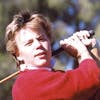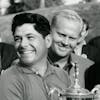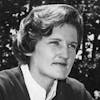Jane Blalock - Part 3 (Persevering Through Adversity)
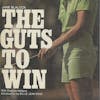
In the third episode of our eye-opening four-part series with golf legend Jane Blalock, "FORE the Good of the Game" navigates through one of the most contentious periods in her career—the LPGA's cheating allegations against her. Known for her 27 LPGA Tour wins and groundbreaking contributions to women’s golf, Jane reveals the emotional and professional toll these allegations took on her and how she resiliently persevered.
This episode zeroes in on that defining moment in 1972 when Jane was shockingly accused of cheating, a claim that shook the core of the golf community. Far from being a deterrent, Jane discusses how this episode became a catalyst for her to rise above the stigma and scrutiny, focusing her energy into her game with a newfound intensity.
Jane opens up like never before, detailing the immediate aftermath of the allegations and the legal battles that ensued. She speaks candidly about the emotional resilience required to rebuild her reputation and provides a remarkable narrative of how she navigated the challenges of the court of public opinion and the LPGA.
Her eloquent recollection serves as a masterclass in overcoming adversity, and it offers valuable lessons for anyone facing unjust accusations or hurdles in their career. Through it all, Jane’s spirit remained unbroken; she continued to excel in the sport she loved, laying the groundwork for her future triumphs and setting an example for generations of female golfers to come.
The episode crescendos as Jane talks about how the adversity eventually brought her a greater sense of purpose in both her sport and her later entrepreneurial endeavors. It’s a powerful testament to her indomitable spirit and unyielding will to succeed.
Don’t miss this compelling episode as we uncover a darker but pivotal chapter in Jane Blalock’s life, illustrating the resilience and character behind her celebrated career. Subscribe now for the concluding part of this engrossing life story, "FORE the Good of the Game."
Follow our show and/or leave a review/rating on:
Our Website https://www.forethegoodofthegame.com/reviews/new/
Apple Podcasts https://podcasts.apple.com/us/podcast/fore-the-good-of-the-game/id1562581853
Spotify Podcasts https://open.spotify.com/show/0XSuVGjwQg6bm78COkIhZO?si=b4c9d47ea8b24b2d
Google Podcasts https://podcasts.google.com/feed/aHR0cHM6Ly9mZWVkcy5idXp6c3Byb3V0LmNvbS8xNzM3Mjc1LnJzcw
About
"FORE the Good of the Game” is a golf podcast featuring interviews with World Golf Hall of Fame members, winners of major championships and other people of influence in and around the game of golf. Highlighting the positive aspects of the game, we aim to create and provide an engaging and timeless repository of content that listeners can enjoy now and forever. Co-hosted by PGA Tour star Bruce Devlin, our podcast focuses on telling their life stories, in their voices. Join Bruce and Mike Gonzalez “FORE the Good of the Game.”
Thanks so much for listening!
Mike Gonzalez 00:15
Well, you're on a roll. And now we come to the 1972 Bluegrass Invitational, and your life's about to be turned upside down. Maybe I'll give the sort of the Cliff's Notes and then we'll double back and have you sort of fill in the blanks for our, for our listeners, but back in 1972, as it happened, Jane Blalock was disqualified after the second round for allegedly replacing a ball incorrectly on the putting green. And then of course signing for a card that didn't include a two stroke penalty for doing that. And so a lot of things ensued. But, but basically what happened is within a month, the LPGA tried to suspend and actually did suspend Jane, who was the current leading money winner at the time and on quite a roll. Jane filed an antitrust lawsuit against the LPGA, which at the outset, was a $5 million lawsuit. And after several lost appeals and being ordered to pay Jane Blalock damages, the LPGA finally agreed to settle this matter. But a lot to talk about here. I think the thing that that the good that came out of this was that it led to some pretty significant governance changes on the part of the LPGA. It gets me back to that, that barnstorming thing. This was a ragtag sort of bunch of professionals that were running their own ship, you know, it was the inmates running the run of the prison, if you will. And and so what happened was with this as it did lead to some transformational change with, with governance and so forth, but but take us back to that, because the thing that that aggravates a lot of people is that these allegations occurred. And yet, throughout time, up until this time, all of your fellow competitors had signed and attested your scorecard. There were no complaints from any observers watching tournaments that anything was going on. And all of a sudden, this thing sort of blows up in your face.
Blalock, Jane 02:15
Yeah. it was dark time for the LPGA. It's was certainly a very dark time for me. But I remember being at that tournament in Louisville, and receiving a phone call from one of the members of the board. And it was like, you know, 10 o'clock at night. And they said, we'd like you to come and just have a conversation with with the board. And I went, Well, can we do it tomorrow morning. And now we'd like to see you now. And so they brought me into the room. And they said that we've had some we've had a few people say that they've seen you mark the ball incorrectly. And yet you signed your scorecard. And so we're going to disqualify you because if that is the case, then you signed a new grip scorecard. I said, but no one ever said anything to me. And they everyone signed my scorecard. I don't quite quite understand this. And I said to you, sure. And Gene McAuliffe who was a tournament operations person was there. And he said, Well, we you know, we were trying to crack down on some, you know, rules transgressions from a bunch of people. And he said, Just if, you know, some people said, they, they thought they saw you do that? And I said, Well, I did. And I said, if I had, if I didn't they say, yeah, yeah, say something, or don't sign this core card or complain. And I said, you know, I can't say that I've put the ball back down in exactly the same place every time because that's pretty difficult. And I would always mark the bog a fraction behind it. So when I'm replacement, you know, nervous, you don't nudge it in any way. And anyway, so they said, Well, we're going to squirrel you five from this tournament. And we'll tell people that you just move the ball, you know, like the putter length, you know, if someone asked you to do and you forgot to move it back. So that was that. And then they had a they said, I can't remember the next tournament or week after that. It was at the title holders at Pine Needles. And so they asked me for a meeting again, and I'd mentioned Ernie Vossler is named before and Ernie I'd met Ernie through Sandra Palmer. There were very good friends and Ernie would watch me hit balls from time to time. And so I went to Ernie and I said, No, something strange is happening here. I don't know what to do. I don't know. I don't want I'm not guilty, I don't want to admit guilt, because then everyone would think I'm guilty. Yeah, what do I do? And he said, well just just go in and say, you know, you who have done something you're sorry. And it wasn't, you know, wasn't intentional. And, you know, let's be friends and move on. So I went to the next week, we had a meeting with the board again. And I said exactly what he said, I said, Yeah, I'm sorry, I may have, you know, may have done some of these things. But I've never didn't intentional, I've never tried to mark, you know, move the ball to benefit myself. I said, I just can't say I've replaced it perfectly every single time. And I said, Boy, you know, I, if I, you know, I have I'm sorry. And then all of a sudden, the meeting was over. And they said, she admitted her guilt. And so I was guilty. And, and then a few, there was a, there was a group. And this, I personally know why this happened. I cannot go into any reveal any names or details, because it's not fair. And I always have taken the higher row and I will continue to do so. But it was, I had it was definitely revenge on something that happened a couple of years earlier. And it was kind of those same people that were kind of waiting for the verdict, the word spread very fast that I had a bit better my guilt. And, and then they as a result, because I was guilty, then I was suspended.
Devlin, Bruce 06:41
May I say something? You know, I think, first of all, I think he got terrible advice from Vossler. On the second part of that is I played on the tour for what, 20 odd years there were players that played on the tour that I can assure you never put the ball back exactly in the same spot. A guy walks out hits a couple of bad shots, and he walks up and he stuffs a you know, a coin behind and it doesn't it's not all obviously you can't get in the center. Unless you're right behind it. Right. You can put a coin behind a golf ball in the center of the golf ball from the side. And you see somebody that's a little hot out of the car, and they stuffed that penny down there. And then they go back and they go through the program. And I'm not saying you did this, I'm just saying that this. It's the hardest thing in the world to on every occasion, put the golf ball back in exactly the same place if you do not mark the ball from behind it. Anyhow,
Mike Gonzalez 07:53
Bruce, the other point, I would make Bruce and you know this, and Jay knows this. As a player ,in a stroke play event, you all share responsibility to protect the field.
Devlin, Bruce 08:04
Of course. Yeah.
Blalock, Jane 08:06
Right. No, that's that's precisely what I said in the scorecard was, you know, was always signed. And you know, and they The challenging thing. And what was made things so obvious is that they said a few players. They, they said they had some video, they had take nothing. Everything disappeared. They didn't have anything. And a couple of those. Suppose it accusations came from two years earlier. And it's like, wait a minute, you wait two years. And it just and I I have copies of all the you know, the court records, affidavits, depositions. And if you read those through those that really shake your head, because there were definitely some contradictions. So there was falsehoods would be the best there are a lot of false statements made. And then those statements were were contradicted.
Mike Gonzalez 09:08
Well, your your point about taking the high road is, is an honorable one. Let me ask you this. Do you intend to have the full story told at some point after you're gone? And if so how you might go about doing that?
Blalock, Jane 09:23
Every now and then I think about it, but this is something that, you know, I personally focus so much on the present. And I am half full in every respect. And even when we were going to have this interview, I was had second thoughts because it's something even I don't want to dig this stuff up because I have so many things I'm trying to accomplish right now. Not to pull me back. So, you know, to really I don't know, I thought by the time but what's it going to accomplish?
Mike Gonzalez 09:58
Well, that's I think that's exactly Right, that's the question to ask is okay. Do I feel better? No, I'm not even here. So what am I really accomplishing? I think, just to put a bow on this, because we could, as you know, do a full podcast just on this subject. But it was a very, very ugly time, to say the least. It was, it was unfair at at best. And, and yet, as I mentioned, and by the way, for listeners that don't know the story, it was very polarizing. And so for the friends and the players that came out in your defense, they faced some difficult circumstances as well. Right. I mean, Sandra Palmer, they, they they put her on probation for a year for simply speaking out on your behalf.
Blalock, Jane 10:46
Yeah. Oh, yeah. It was. It was an interesting time, you know, for for a couple of years. And I always said that, the whole process it made the Klu Klux Klan look honorable. And
Devlin, Bruce 10:59
We called it a kangaroo court.
Blalock, Jane 11:01
Exactly. It was precisely kangaroo court. And, you know, I said it was an I played during that time that was, there were Yeah,
Devlin, Bruce 11:12
you're on, you're still on your streak at that time. Why don't you? Yeah, yeah, we're gonna get making cuts of making cuts all the time.
Blalock, Jane 11:20
Yep. So I was always around for the weekend. And, you know, gradually at thought and players came around. And, you know, the nice thing is, I had many apologies. So they just had hearsay and didn't never saw me do anything wrong. And, you know, just so I felt that. How did I play? Well, during that time, I just felt was important. I wanted to prove. I thought, if I had done that wrong, there's no way possible I could perform well, because I could not play with that guilt, in a sense that I had done something that was illegal or detrimental to the LPGA. So that drove me is that I have to prove a point here
Devlin, Bruce 12:05
and prove a point you did.
Mike Gonzalez 12:07
The LPGA was able to take lemons and turn it into lemonade somewhat because they it forced them to make a lot of structural and governance changes all for the better, because it forced them to grow up and become a real professional organization. What sort of change what sort of things that were they forced to do at that point?
Blalock, Jane 12:26
Well, then it was you can't have players ruling against other players. So we can't have any of that conspiracies.
Devlin, Bruce 12:34
Their obligation is on the Golf Course.
Blalock, Jane 12:36
That's right. Yeah. And so now you have a, you know, a commissioner and you have a you know, we have a policy and a way of doing things where that would not, that would not happen again.
Devlin, Bruce 12:48
Yeah, yeah.
Mike Gonzalez 12:50
Well, I use the term resilient that at the outset, because, you know, for one reason, you march right down to the Dallas Civitan at Brookhaven had beat Kathy Whitworth in a play off coming out of this
Blalock, Jane 13:03
way. No, I and I had that one. I obviously remember extremely well. Kathy and I later on mended fences and became friends. But she was she was not in my court. And I do remember making a pot in a play off. And this is funny because I threw the putter in the air and caught it but I got fined for throwing you know, in exhilaration. I got fined for throwing my club it was you know, hallelujah. I won this tournament. But I have the headline in the Dallas newspaper was "Blalock dumps establishment."
Devlin, Bruce 13:44
Oh, is that what they said? That was
Blalock, Jane 13:46
that was the headline. And I have that because someone made a put it on a plastic plate or plaque for me. So I still have that.
Devlin, Bruce 13:55
Well you should, it's history.
Mike Gonzalez 13:58
Yeah. How satisfying was that win?
Blalock, Jane 14:01
Very! Yeah, that was that was special. And in Dallas to that may do even home turf. And yeah, I think that helped me win a win over a few people.
Mike Gonzalez 14:16
What was your source of strength as you were fighting through this adversity to come right back and win at this level again?
Blalock, Jane 14:25
Well, I had the media on my side. I had the fans predominantly on my side, I think kind of seeing you know that I was the kind of the pig tailed young girl who would, you know, from New Hampshire that came up was winning tournaments. And all of a sudden it was, you know, these accusations and rulings against her. You know, the fans. It gave me such support. But, you know, I have this inner strength. And I credit my parents with that believing in yourself and Again, my, you know, my positive attitude. So I was going through all of that helped me so much later on in my life. Because it it gave me courage. I learned how to become a decent speaker because I had so many interviews, after rounds of golf, how do you how do you endure this? And just, it just made me stronger. And every way it's like if you can go through that, you know, to kind of put a new perspective on life. I've always been a happy person, but I became a much happier person knowing that the little things don't bother me.
Mike Gonzalez 15:42
You know, what, if we fast forward to just a few weeks later in early November, you win another golf tournament? I got a question about that one. It's the Lady Errol Classic down in Florida and one source that our research said was that it was in a playoff Of course, and but the newspaper article only mentioned Sandra Palmer not Kathy Whitworth, was it against both Do you remember?
Blalock, Jane 16:06
Yes, it was, it was.
Mike Gonzalez 16:07
okay. For whatever reason, the newspaper article only mentioned you and Sandra and the playoff the one I read, but I just wanted to check that.
Blalock, Jane 16:16
No, I remember it. No, it was against both of them. Yeah. I don't know why and I yeah, I I remember beating them. But I don't remember why one was eliminated because it was had all my my college buddies out watching me to arrow because now you're in the greater you know, Orlando area.
Mike Gonzalez 16:37
Yeah. Yeah. Just do anything special, like hold a three wood from the fairway to be a bunker show?
Blalock, Jane 16:47
No, but I made a birdie to win on the playoff that I remember. I don't recall. I don't recall how. But I had a really, really good last round.
Mike Gonzalez 16:56
I didn't add them up. Bruce. You took Kathy down on a few playoffs. Her playoffs? You remember what her playoff record was Bruce?
Devlin, Bruce 17:06
Yeah. Do you mean? Kathy Whitworth? Oh, yeah, I know what a play. I know. I don't know. But I can assure you it wasn't very damn good.
Mike Gonzalez 17:18
You know, it was either six or eight and 20.
Devlin, Bruce 17:21
Yeah. Wow. Yeah. Hard to imagine. And it's,
Blalock, Jane 17:25
so I have to change my answer earlier. I had to go back to Mickey Wight as opposed to Kathy Whitworth.
Devlin, Bruce 17:33
Well, on that subject of playoff you today, adding your history to all of the notes that Mr. Gonzalez keeps about playoffs? You are one of the few who have a positive playoff record on the LPGA. You know, do you know what the the winning percentage is of all of your great players? Now 43%. So 40 of the greatest players on the LPGA have a a minus playoff record basically. Which is it's remarkable to think of all the great players that they don't have a winning playoff record.
Blalock, Jane 18:16
Yeah, that's an interesting statistic. Yeah, yeah. I enjoyed playoffs. I said, Wow, you got this far. So let's finish it because we'll finish it. Yeah.
Mike Gonzalez 18:25
Yeah. Yeah. So there was a, there was a two year break between wins 72 to 74. Bruce always asks about these, obviously, coming out of what you came out of in 72. I don't want to I don't want to make any assumptions, what was going on?
Blalock, Jane 18:41
Just you know, it was quite an emotional roller coaster. And, and I also had, you know, I had back troubles off and on, you know, ever since the, you know, playing in the back brace at the diner on the show, but I think it was, you know, so involved in all I mean, we went to trial, you know, being courts and the depositions and and dealing with, you know, some of those factions and defending yourself. It just it just took a you know, a huge toll on me and I didn't I took some time off but I didn't take a whole lot of time off, but it was a combination of a lot of things. Yeah,
Mike Gonzalez 19:22
well, we're getting ready to go into 1974 and you're getting ready to go on a roll. Bruce, how about it in 74 four wins,
Devlin, Bruce 19:31
four wins. Yes. Started off with the Bing Crosby International then you win in Birmingham and then the Southgate Ladies Open and finish again second time at the Lady Errol classic
Blalock, Jane 19:46
yeah I like I said like repeats certainly know once you like a Golf Course it obviously there's something meaningful there. You have good thoughts. Yeah, I think it was having a You know, most of the lawsuit behind me, it's like, wow, this is this is fine to play. Yeah. And I said, By this time, you know, I said everything had dramatically thought and you know, it was just like life was good and, and my golf game was good.
Mike Gonzalez 20:20
Yeah. And you continued on, you know, we get to, to 1975 winning the Karsten Ping Open at Camelback over JoAnne Carner. And then And then you mentioned the, you know, the the World Ladies and playing over in Japan, you win that in 1975 We didn't ask you when we brought up Japan, but we've heard a lot of great Japanese bus stories.
Devlin, Bruce 20:44
You got any bus stories? I know you do.
Blalock, Jane 20:49
Well, I'd say Kathy Whitworth was the best dancer.
Mike Gonzalez 20:53
That seems to be unanimous.
Blalock, Jane 20:55
And Amy Alcott was the worst.
Devlin, Bruce 20:57
Yeah, that's what we heard. Amy was terrible.
Mike Gonzalez 20:59
That also was unanimous. Yeah.
Blalock, Jane 21:01
And Juli Inkster could she could sing Aretha. But that was that. Yeah, those stores were absolutely the best. And we we had more fun and you know, bring on the Kiren and the Sapporo and the Asaki beers. And
Devlin, Bruce 21:18
yeah, what were you mostly in? Most of the time was the two buses, right? A lot of times Yes. Two buses. Were you ever in the back in the in the trailing bus? At any time?
Blalock, Jane 21:32
I don't remember that. I just remember the challenge was trying to get making the pitstops. And, and really learning how to squat. That's a little a little graphic.
Mike Gonzalez 21:50
Yeah. Well, you know, we've heard about we've heard about there was the party bus and then the other bus. So we were just wondering which bus you might have been on?
Blalock, Jane 21:59
I odds on I was typically in the party bus. You know, you should yeah, they would. You know, we stayed in nice hotels were you know, they have English speaking. And they we were treated like royalty. There were I love playing over there. But they would you know, in the hotel, they would give you chits for your breakfast, lunch and dinner. Well, we never had time to have breakfast, lunch and perhaps dinner. And so we always saved up the chips, the chips. So whenever one victory or one that we all had these chips, so we thought was it was Debbie Massey, Jan Stephenson. Oh gosh, Sally Little. And we just all through our chits into a pile middle of the table. And they ran out of Dom Perignon. And then list then they ran ran out of their finest burgundy. So we took full advantage of all of our chiys. So if that answers the question, which bus I was in?
Mike Gonzalez 23:08
Yeah, amen to that. So one of our guests told us about and maybe you were on this trip told us about the opportunity to visit Imelda Marcos his shoe closet.
Blalock, Jane 23:22
Yes, I was on that trip. In fact, I played in the pro-am with Ferdinand
Devlin, Bruce 23:29
Oh did you?
Mike Gonzalez 23:30
President Marcos
Blalock, Jane 23:32
Quite he was quite a sportsman. And just a fairly good golfer. And but not too bad naive, but I couldn't figure out why he had like, you know, least 25 kind of semi caddies out there with little briefcases surrounding him during the entire round of golf. I certainly found out why later. Yeah. Little machine guns protection. And then yeah, then we all had a tour took us through you know, it's you went through slum is you need to worry about shanty towns. On the way it was really depressing on the way to the palace. Yeah. And so we got to sit in the on the thrones and yeah, we spent time saw melges closet and yeah, so spent time with Imelda and Verde.
Mike Gonzalez 24:31
Yeah, what great life experiences golf brought to you ladies.
Blalock, Jane 24:35
Yeah. Oh, it was it again. This is primarily Colgate responsible for you to allowing us to do all this. And yeah, I mean, I you know, saw the world and you saw it and style. And you get to travel as a local. It was we retreated to so, so well, and that's why I count my blessings are every single day.
Mike Gonzalez 25:02
Well Bruce, let's come back to the USA where I'm graduating from college and Jane is continuing to win on the LPGA Tour in 1977.
Devlin, Bruce 25:12
Well in 1976 she won the Wheeling Classic. In a playoff with
Mike Gonzalez 25:18
Oh, I skipped that one.
Blalock, Jane 25:19
Yeah, that was that was really a good year. In fact, when I went in Wheeling, we all stayed in cabins. There were like two dueling cabins we had. I mean, I know Beth Daniel was in mind again, Sally Little. Oh, God, Sylvia Bertolocini we had was cabin against cabin. And well, I became the Wheeling was at Ogelby Park. So I was anointed Miss Ogelby Park, because I won it back to back and brought our cabin the victory. Ah, good. So that that I remember very well. And yeah, that was just that was yeah, I played well that year and it was fun winning Dallas a couple of times. It was fun beating Kathy.
Devlin, Bruce 25:19
Pat Bradley Yeah, that's okay. And then she got into her "do it again deal" the 1976 Dallas Civitan where she gave Kathy another one of her runner up finishes. And then she won the second time at the World Ladies at Ibaraki Golf Club in Japan. So 76 was a pretty good year.
Blalock, Jane 25:48
Ya know, just only by nine shots too I might add. Yeah, that was, you know, just I don't remember specifics, but that was a great ball striking year. I just I hit it so well. Just really? Yeah, just really a joy to play.
Mike Gonzalez 26:57
You played 40 straight holes, a lot of bogey in that tournament against Kathy Whitworth. So that's that's pretty solid. We go into 1977. Then and, and you win the Greater Baltimore Classic. You win the Sarah Coventry. And I'll just mention briefly and then I'll ask you about her. You remember Liz Kahn, who wrote the
Blalock, Jane 27:20
Oh, yes. Oh, yes. Yes.
Mike Gonzalez 27:24
So Liz Kahn wrote the unauthorized version of the history, the first 50-year history of the LPGA. And the reason I bring this up, twofold. One, one of the tournaments you won in 1977 was by three over, among others. Joyce Kasmirsky. Right. So we're talking to Gloria Ehret, who you know, quite well, and we'll talk about that later. And so Gloria mentioned Liz Kahn and her book, which we've now used as a resource because it's got some, some stories about you and a lot of the others that we've talked to, well, I order a book from Amazon, right? So here's, here's where people can see there's, there's the book, and if you open up the inside cover off, I don't know if you'll be able to see this, look who signs that. Can you read that?
Devlin, Bruce 28:13
Joyce Kazmierski
Blalock, Jane 28:14
Oh my gosh.
Mike Gonzalez 28:16
Isn't that something?
Blalock, Jane 28:17
Oh, yeah. Yeah. Kaz, she was a very good, well she was still is I just don't really see her very often. Great, great gal, great player. Fun person.
Mike Gonzalez 28:30
This was a book that she addressed to Barb to the LPGA's Number One Fan, Joyce Kazmierski. And I got it from Amazon. How cool is that.
Blalock, Jane 28:38
That is. That is amazing.
Mike Gonzalez 28:40
So anyway, late in June, I'm in London. And who do I have a nice dinner with, Liz Kahn.
Blalock, Jane 28:52
Oh, she was such an interesting character. She actually came to quite a few of our tournaments. And yeah, we've had some nice candid conversations.
Mike Gonzalez 29:01
Yeah, yeah. So I just thought that was fascinating to to get her perspective on on things. Of course, she's got to be she's getting up there. But we had a lovely dinner and it was just a delight to sort of catch up and have her share the stories of the stories she wrote about you guys. Yeah. I thought that was kind of kind of cool. So let's go to 1978 Bruce, or is that right? Or 1979? I
Devlin, Bruce 29:28
guess 79, 78 was the Orange Blossom Classic and Pasadena. And the Mayflower Classic at Harbor Tree Golf Club where we see Ms. Kazmierski' number come up again, Wheeling Classic, Golden Lights Championship and at the end of the year, the Izuzu Ladies Cup so quite a quite a year 1978. Five victories.
Blalock, Jane 29:51
Yeah, that was that was a good streak again the yeah the wheeling Miss Ogelby Park strikes again. Yeah,
Devlin, Bruce 30:05
the Golden Lights Championship in California Hollis Stacy you beat there by two shots.
Blalock, Jane 30:10
But I remember that one because I've never forget an article by Jim Murray, the revered, you know, columnist for The LA Times. And he said that I could make a six iron play Carmen.
Devlin, Bruce 30:27
Oh, pretty good,
Mike Gonzalez 30:30
That might be the ultimate compliment.
Blalock, Jane 30:32
I think of that. I said, Where's I said my Carmen's a little off key right now. But that was the ultimate compliment from such a an accomplished writer. It's such a beautiful writer, I mean, just but I love I, my dad was an editor and a writer. So I, I thoroughly enjoy and respect and, you know, just enjoy reading the works of good writers. So I heard that from Jim Murray. But the other part of that I had a lead going in the last hole, and the charitable affiliate of that tournament was must multiple sclerosis. And I said, Okay, you know, the cardinal rule, you'd never think about your speech walking down 18 But I kept saying, Okay, I've got to pronounce multiple sclerosis. And I got to the presentation and said muscular dystrophy.
Mike Gonzalez 31:34
Hello, Jerry Lewis.
Blalock, Jane 31:36
So yeah, so I blew it. But it's funny, I said the silly things that we we all recall from tournaments, seldom the shots it's usually the circumstances or happenings around it.
Mike Gonzalez 31:49
Isn'y the mind a funny thing now? If anybody were watching that tournament, let's say on television, because even imagine what would have been going through your mind?
Devlin, Bruce 31:56
Yeah,
Blalock, Jane 31:57
Exactly.
Mike Gonzalez 32:00
1979 four more wins. Bruce.
Devlin, Bruce 32:03
Oh, yeah. Do you just you you were on a tear right there. The late 70s weren't you? The Orange Classic. And guess what, again, six over Sandra Post, Florida Lady Citrus, again, the Otey Chrisman Classic. And then you finish the year off at the Sarah Coventry, again. You love to come back and win don't you?
Blalock, Jane 32:30
Yeah, I like certain cities. It has a good feel. There's one tournament that I want to bring up because it's not on the list and for a reason. So Sandra Palmer and I won the Angelo's Four-ball. It was a team event. And we won it twice. It was on Cape Cod different like from well, three great courses on Cape Cod, rotate. And so for a long time, in my bio, I had won 29 tournaments. And Sandra had won I think it was 21 at that time. And so then about 15 years later, way after the fact I get this notification from someone at the LPGA, oh, we're we're taking away your two tournaments because they were a team championship. I went okay, so you know, didn't think much of it. Until then first the men had their tournament in New Orleans, you know, Team official money. And then the LPGA has the Dow which official money the last three years. So I you know, I send a note. And I said I have all the old player guides it's under official wins, you know, Angelo's Four-ball. And it was more for Sandra because I felt she had a better chance of getting into the Hall of Fame. because Sandra went from 21 to 19. I may not have that perfectly but so on Sandra's behalf I I started saying hey, why don't what's what's going on here? No, this is official. Ours was official. So anyway, they took away those events and did not, denied reinstatement. So that's one where we felt we should have had a couple more.
Mike Gonzalez 34:19
Yeah, that was 1972 and 1973. When the two of you won those
Blalock, Jane 34:26
Yeah, your your facts are better than mine.
Mike Gonzalez 34:29
Well, we certainly know about it, like you said not on the official list, but it was certainly on the list of of your wins. I've got to ask you this because it's something you've mentioned to me. There were a couple of other instances. Oh, maybe in a courtroom where you were asked by the LPGA to get involved on their behalf. Why don't you just share for our listeners, those two instances, those are interesting.
Blalock, Jane 34:53
Yeah, that was kind of, again, interesting experience. But the first was, well, Bruce, Moss Creek, It used to be called the Women's Masters.
Devlin, Bruce 35:03
Correct?
Blalock, Jane 35:04
Until Clifford Roberts didn't like it. And so the Augusta Masters sued the LPGA wanted to take him to court to get rid of the Women's Masters? Because it's an infringement on their Masters. And so it did go to court and Augusta and the LPGA asked me to represent the LPGA to plead the case. When I get to the courtroom, and I figured Clifford would be there, but they brought in Arnold Palmer. I don't know who else but I went Oh, okay. This is this is quite strong adversary. Yeah. And anyway, it was spent a couple of days in court and Clifford Roberts prevailed. Probably no big surprise. And then the second time was, was really a lot of fun. It was LPGA asked me to represent them. And Tim Finchem was before he was Commissioner of the PGA he was an attorney. So we were sent to Washington DC, to plead our case, to the Senate Finance and the Congressional Ways and Means Committee, as to why that the golf why the two organizations PGA, LPGA, respectively, should remain why they're not for profit and shouldn't be taxed as such. Right. And so I had the senator from Maine, George Mitchell, who was he was head of the Senate Finance Committee, so I spent probably two hours with him. And explaining, you know, really educating him on how the game of golf worked and, and the charities that were involved in how this would be the negative impact on the charities. And then, Judd Gregg, the congressman, who was head of the Ways and Means Committee, in Congress, so I spent the time with Judd. And this one we won. So I met Tim years ago, as we collectively kind of, you know, divided and conquered. He went to some of his contacts, and I went to mine but that was, that was a really cool experience. So I guess things had turned around with the LPGA. Well, I, you know, I'm the one selected to represent them in very significant matters. Yeah, I
Mike Gonzalez 37:34
thought that was an interesting turn around. So you got a winning record in the playoffs, and you got a winning record in the courtroom. So that's pretty good.
Blalock, Jane 37:44
Right, I'm two and one.
Mike Gonzalez 37:47
Thank you for listening to another episode of FORE the Good of the Game. Please, wherever you listen to your podcast on Apple and Spotify. If you like what you hear, please subscribe, spread the word and tell your friends. Until we tee it up again, FORE the Good of the Game, so long, everybody.
Music playing 38:06
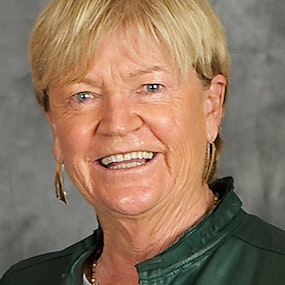
Blalock, Jane
Golf Professional
Jane Blalock is a former LPGA Tour champion who won 27 times and is perhaps best known for her record 299 consecutive tournaments played without missing a cut.
Today, Blalock is involved with two significant golf properties that have had a huge impact on advancing women in the game for the past two decades: the Women's PGA Clinics and Legends of the LPGA, Official Senior Tour of the LPGA.
Golf champion. Business guru. Activist trailblazer. Jane Blalock has racked up a lifetime of achievements that few others can claim.
Blalock joined the LPGA Tour in 1969 and remains one of its winningest players in history with 27 titles. A record-holder across all professional men’s and women’s golf tours, playing 299 consecutive tournaments without missing a cut, she retired from the tour in 1985 but not the sport, and has continued to have an indelible impact.
She founded JBC Golf, Inc. in 1990. This Boston-based golf and event marketing firm creates golf sponsorships and marketing opportunities for Fortune 500 companies and major corporations, consistently delivering goal-driven results. In 2001, Blalock spearheaded the Women’s Senior Golf Tour – now known as Legends of the LPGA, official senior tour of the LPGA – a coup for women of professional golf age 45 and over, creating opportunities for continued competitive golf in career afterlife.
Blalock also created and now heads up Women's PGA Clinics, a 30-year program that brings advanced instruction to the growing number of women who’ve developed a love of the sport for business and pl…
Read More
New to FORE the Good of the Game?
Here are some great episodes to start with. Or, check out episodes by topic.
















